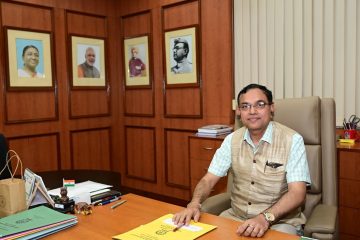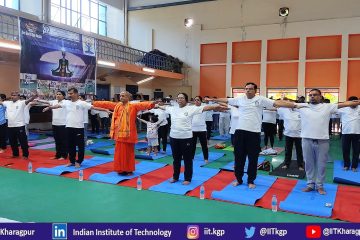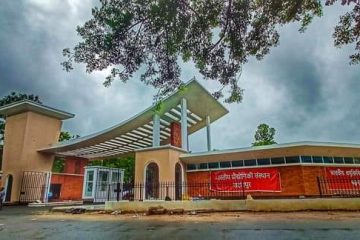Prof. G. P. Raja Sekhar has an extensive academic background in mathematics and applied sciences. He completed his Ph.D. in Mathematics (Fluid Mechanics) from the University of Hyderabad in 1997, following an M.Phil. in Applied Mathematics (Fluid Mechanics) in 1993, and an M.Sc. in Applied Mathematics in 1992 from the same institution. His foundational education includes a B.Sc. in Mathematics, Physics, and Chemistry from Andhra University in 1990, as well as Intermediate and S.S.C. education from the Andhra Pradesh Board of Intermediate Education and Board of Secondary Education, respectively.

With over 27 years and six months of experience in teaching and research, Dr. Raja Sekhar has held various academic positions. He is currently a Professor of Mathematics at IIT Kharagpur, a position he has held since 2019. Prior to this, he was a Professor from 2011 to 2019, an Associate Professor from 2007 to 2011, and an Assistant Professor from 2002 to 2007, at IIT Kharagpur. His international exposure includes serving as a JSPS Post-Doctoral Fellow at Tokyo University of Agriculture & Technology, Japan from 1998 to 2000. Earlier in his career, he worked as a Visiting Faculty at IIT Kharagpur and as Guest Faculty at the University of Hyderabad.
Dr. Raja Sekhar’s research focuses on Partial Differential Equations and Fluid Mechanics, particularly in the areas of biphasic mixture theory applied to deformable porous media, thermocapillary migration of viscous droplets, modeling flow through anisotropic porous media, multiphase flows, and boundary integral methods. He has supervised multiple PhD scholars, many of whom are now faculty members at esteemed institutions such as IITs, NITs, and international universities.

His contributions to research have been supported by several prestigious national agencies, including the Council of Scientific and Industrial Research (CSIR) and the Science and Engineering Research Board (SERB). His projects include studies on modeling pre-lens and post-lens tear film using anisotropic porous media, mathematical modeling of cartilage in knee joints, singularity methods for Stokes Flows, and the development of extended finite element methods for modeling cohesive discontinuities. His research output is extensive, with 112 publications in internationally reputed journals such as Physics of Fluids, Journal of Fluid Mechanics, Computers and Mathematics with Applications, Proceedings of the Royal Society A, and Mathematical Methods in the Applied Sciences.
In addition to his research, Dr. Raja Sekhar has held several administrative roles at IIT Kharagpur. He has served as the Dean of Faculty of Sciences & Humanities (2020-2022), overseeing academic and faculty recruitment matters, and as the Dean of Planning & Coordination (2020-2021), where he played a key role in national and international rankings and planning. He was also Chairman of the Career Development Centre (2018-2020), where he led student placement and internship initiatives. His leadership extends to national-level responsibilities, including serving as Convener of the All IIT Placement Committee (2018-2019) and Chairman of GATE/JAM 2014, where he oversaw the first fully online administration of the GATE exam.
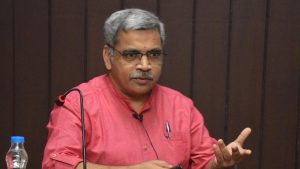
As a principal investigator, he has led groundbreaking projects on singularity methods for Stokes flows in the presence of rigid planar interfaces, along with developing computational frameworks for studying complex fluid interactions in porous environments. Furthermore, in his role as a co-principal investigator, he has contributed to the development and implementation of the Extended Finite Element Method (X-FEM) for modeling cohesive discontinuities in rock mass, demonstrating his expertise in computational mechanics and engineering applications.
A highly esteemed member of the academic community, Dr. Raja Sekhar holds memberships in multiple national and international societies. He is a Fellow of the National Academy of Sciences India and the Andhra Pradesh Akademi of Sciences. He has served as an Executive Council Member of the Indian Mathematical Society (2017-2024) and was the President of the Indian Society of Theoretical and Applied Mechanics (ISTAM) in 2020. His contributions to editorial work include serving as Associate Editor for the Journal of Engineering Mathematics (Springer, 2023-2026), Managing Editor of Differential Equations and Dynamical Systems (Springer, 2023-2025), and Editorial Board Member of the Journal of the Indian Mathematical Society (2022-2025).
Dr. G. P. Raja Sekhar has made significant contributions to academia through his research, teaching, and administrative roles. His work in fluid mechanics, mathematical modeling, and numerical analysis has been widely recognized in the academic community. His leadership at IIT Kharagpur and contributions to national education policies have further cemented his role as an influential figure in Indian mathematics and applied sciences.
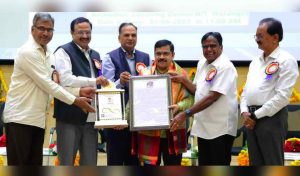
Dr. Raja Sekhar has been recognized with numerous awards and honors, including the Fellow of the International Artificial Intelligence Industry Alliance (2024), National Mathematician of the Year by Ponnala Trust at NIT Warangal (2023), and Fellow of the West Bengal Academy of Science and Technology (2022). He is also a Fellow of the National Academy of Sciences India (2020) and has received the JBS Gold Medal (2018) from the Indian Academy of Mathematical Modeling and Simulation. His international accolades include the prestigious Alexander von Humboldt Fellowship in Germany (2008-2010) and the INSA Young Scientist Award in Mathematical Sciences (2002), among others.
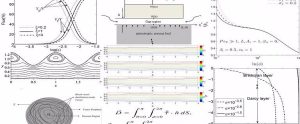
His research interests are:
Existence and uniqueness results for multphase flow models: In a continuum system of a deformable porous media there exist two momentum equations, one for solid displacement and the other for fluid velocity, in coupled form. However, one can approximate the momentum equations and obtain the famous Darcy equation and Brinkman equation for rigid porous media by ignoring the deformation of solid skeleton. Prof. Raja Sekhar and his team employ mixture theory to model hydrodynamic and nutrient transport inside biological tissues, say, tumor, glycocalyx layers etc. Further, their purpose is to check the well-posedness of these PDEs in generalized sense and try to obtain weak solutions.
Viscous flows under external gradients, active droplets: One can find bubbles in various systems like boiling water reactor and drops in spray cooling components, oil industry etc. In most of these applications, one has to understand interaction of drops under external gradients, say, thermal and chemical effects. The team studies hydrodynamic interactions of bubbles or drops and migration of microorganisms and active droplets via mathematical models.
Viscous flow through anisotropic porous media: A porous material may consist of a homogeneous isotropic or anisotropic structure. Corresponding permeability takes a scalar or a tensor form respectively. The assumption of anisotropic nature would make the corresponding governing equations less user friendly to treat analytically. Our object is to investigate the hydrodynamic problem using the generalized Brinkman- extended Darcy model which takes into account the effect of the anisotropic parameters of the porous matrix.
Boundary element methods for viscous flows: The boundary integral equation approaches and their discretization into boundary element methods (BEM) have produced successful solutions to various problems in the field of low-Reynolds number hydrodynamics, biomechanics, acoustics, and free and moving boundary problems. We are going to solve some problems involving viscous flows and flows through porous media using boundary element methods.
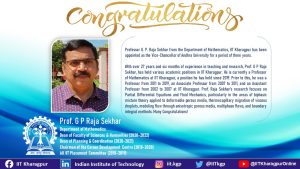
Media Coverages:
| The Hindu | Times of India |
| Deccan Chronicle | Hello Vizag |
| AP 7 Am |
Edited By : Poulami Mondal, Digital & Creative Media Executive (Creative Writer)
Email: poulami.mondal@iitkgp.ac.in, media@iitkgp.ac.in, Ph. No.: +91-3222-282007
Follow us on: Facebook – IIT Kharagpur; Twitter – @IITKgp; Instagram – @iit.kgp; LinkedIn – Indian Institute of Technology
For news visit: https://kgpchronicle.iitkgp.ac.in/

